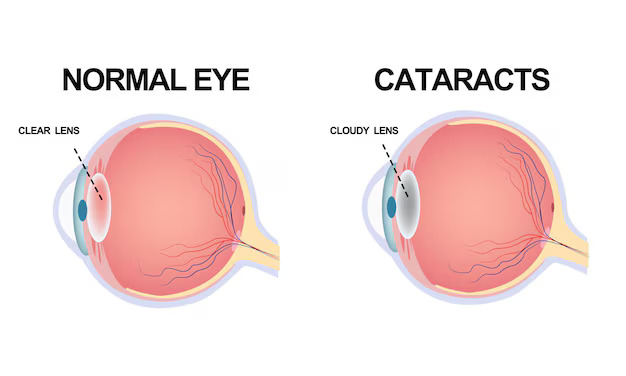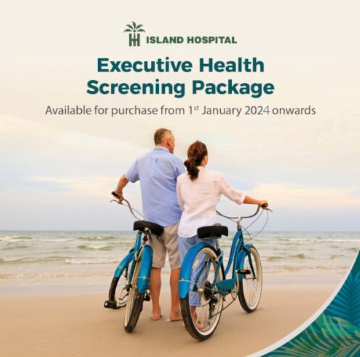
17 Oct Cataract
Cataract
By Island Hospital | Aug 11, 2025 3:13:44 PM
A cataract is a cloudy area on the lens of the eye, which is a clear structure that focuses light that enters your eye.
You might not notice any changes first. However, as the condition progresses, your vision may become increasingly blurry or hazy – like looking through a foggy window.
While cataracts are usually related to age, it can also be caused by eye injuries, eye surgeries (e.g., for glaucoma), or certain underlying diseases.
In this article, we’ll cover the symptoms, treatment options, and prevention strategies for cataracts, as well as the risks of leaving this condition untreated.

Photo by Freepik
What Is the Main Cause of Cataracts?
The eye’s natural crystalline lens helps us focus on people and things at varying distances. Unfortunately, as we grow older this lens often stiffens and hardens, and without its youthful suppleness, it loses its ability to focus, creating vision problems.
This condition — for most, a natural consequence of aging — is called presbyopia.
As we age, these changes occurring to the natural crystalline lens can lead to the development of cataracts or a loss in clarity of the lens.
Since the lens is no longer as flexible or as clear as it used to be, the eye can’t focus on light properly.
Symptoms
At first, symptoms may be undetectable or very slight. However, any noticeable change in vision may be a cause for concern and should be brought to the attention of an eye care professional.
Common symptoms of cataracts include:
- Cloudy or blurred vision
- Sensitivity to light and glare
- Frequent prescription changes for glasses or contact lenses
- Poor night vision
- Color vision changes and dimming
- Double vision in a single eye
If you experience any of these symptoms, schedule an eye exam with an ophthalmologist.
“Do I have glaucoma or cataracts?” — In this article, we explore their key differences, similarities, and whether one increases the risk of the other.
Treatment
While there is no way to prevent cataracts, there are things you can do to slow their formation.
Modifiable factors that increase the risk of cataract include smoking, high blood pressure, obesity, and excessive alcohol intake. You may also slow the formation of cataracts by protecting your eyes from direct sunlight.
In the beginning stages of cataracts, vision may be slightly improved using forms of visual correction. However, in the later stages, surgery may be required.
Fortunately, surgery has proven to be extremely successful in the removal of cataracts. During cataract surgery, your physician will replace your natural lens with an intraocular lens (IOL) implant.
Prevention
There is no proven way to prevent cataracts. But certain lifestyle habits may help slow cataract development. These include:
- Not smoking
- Wearing a hat or sunglasses when you are in the sun
- Avoiding sunlamps and tanning booths
- Eating healthy food
- Avoiding the use of steroid medicines when possible (some people need them)
- Keeping diabetes under control
Diabetic retinopathy is one of the largest causes of vision loss worldwide. Understand your risk factors and explore the prevention and treatment options available.
Risks – If Left Untreated
If left untreated, cataracts cause continual loss of vision, eventually leading to legal blindness or even total blindness.
In the case of blindness caused by cataracts, vision usually can be successfully restored with cataract surgery and implantation of an IOL.
Protect Your Vision Now!
Cataracts are the number one cause of blindness worldwide. However, with regular eye check-ups and the right course of treatment, you can preserve and/or restore your vision.
At Island Hospital, our ophthalmology department comprises a team of internationally recognised ophthalmologists dedicated to providing exceptional eye care for visual impairments, conditions, and diseases.
Our commitment to excellence in advanced diagnostics, cutting-edge therapies, and compassionate support has earned us local and worldwide recognition:
- A finalist for Malaysia’s Flagship Medical Tourism Hospital Programme
- A place on Newsweek’s list of World’s Best Hospitals 2025
Time is of the essence when it comes to eye health. Don’t wait for symptoms to worsen – Book your eye exam with us today.
Don’t Wait Until It’s Too Late – Get a Screening That Covers All The Bases

We’re offering our comprehensive Executive Health Screening Package at only RM760 – giving you a complete head-to-toe health assessment for peace of mind.
Our package features vital health screenings, including Eye Tests, Cardiovascular Assessment, Full Blood Picture, Radiological Screening, Diabetes Screening, Kidney Function Test, and much more.
What’s Included in Your Screening Experience:
✔ Physical examination
✔ Complete medical report
✔ Consultation by Health Screening Physician/Specialist
✔ Light refreshments
✔ Exclusive Island Hospital woven bag







